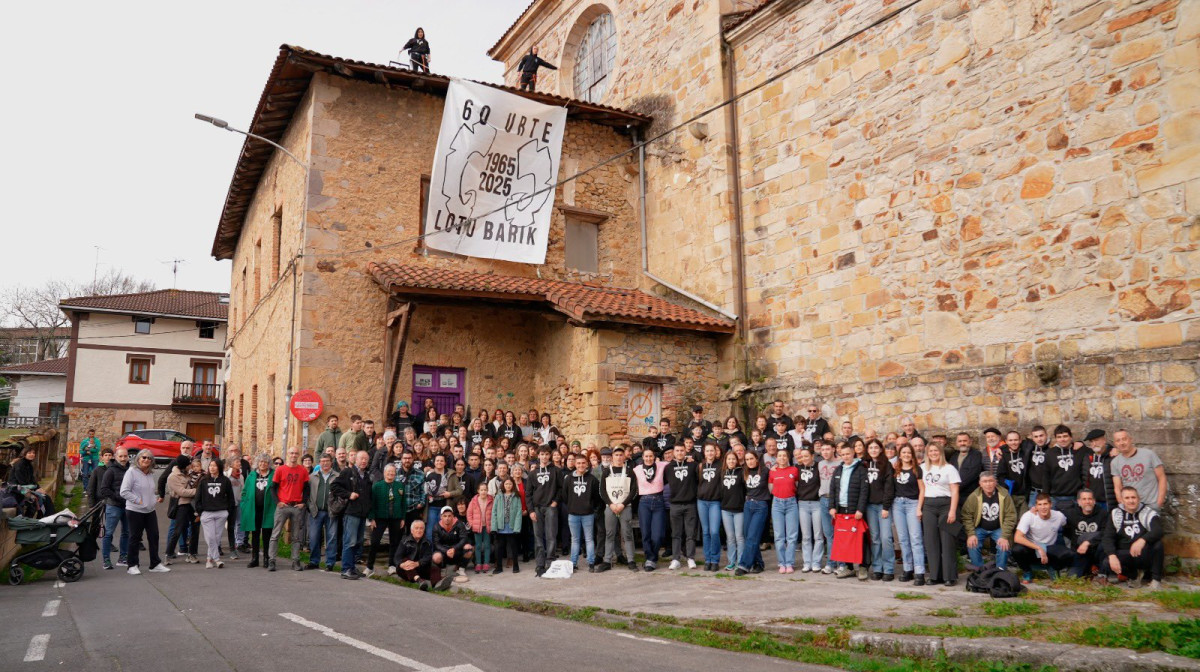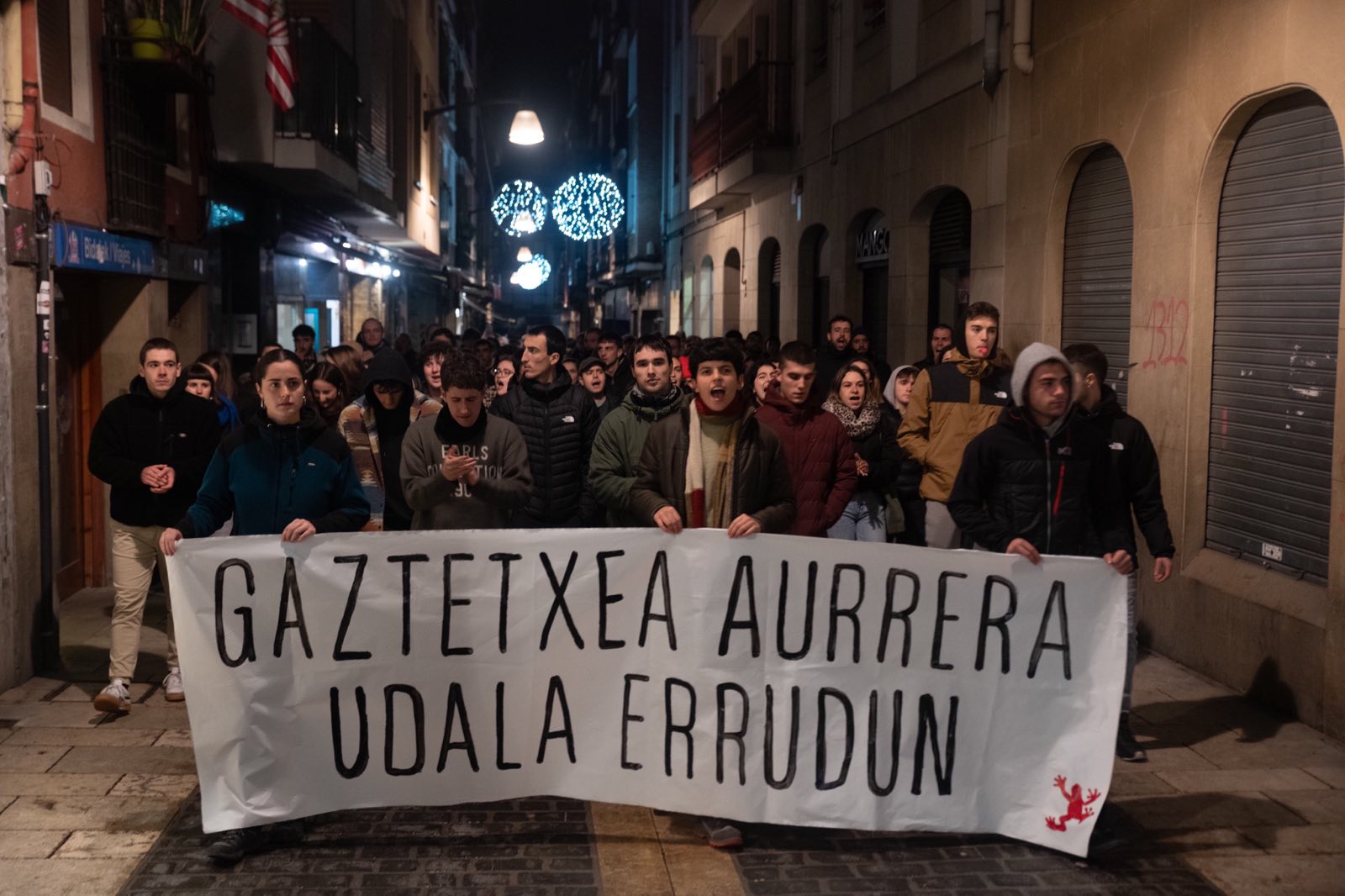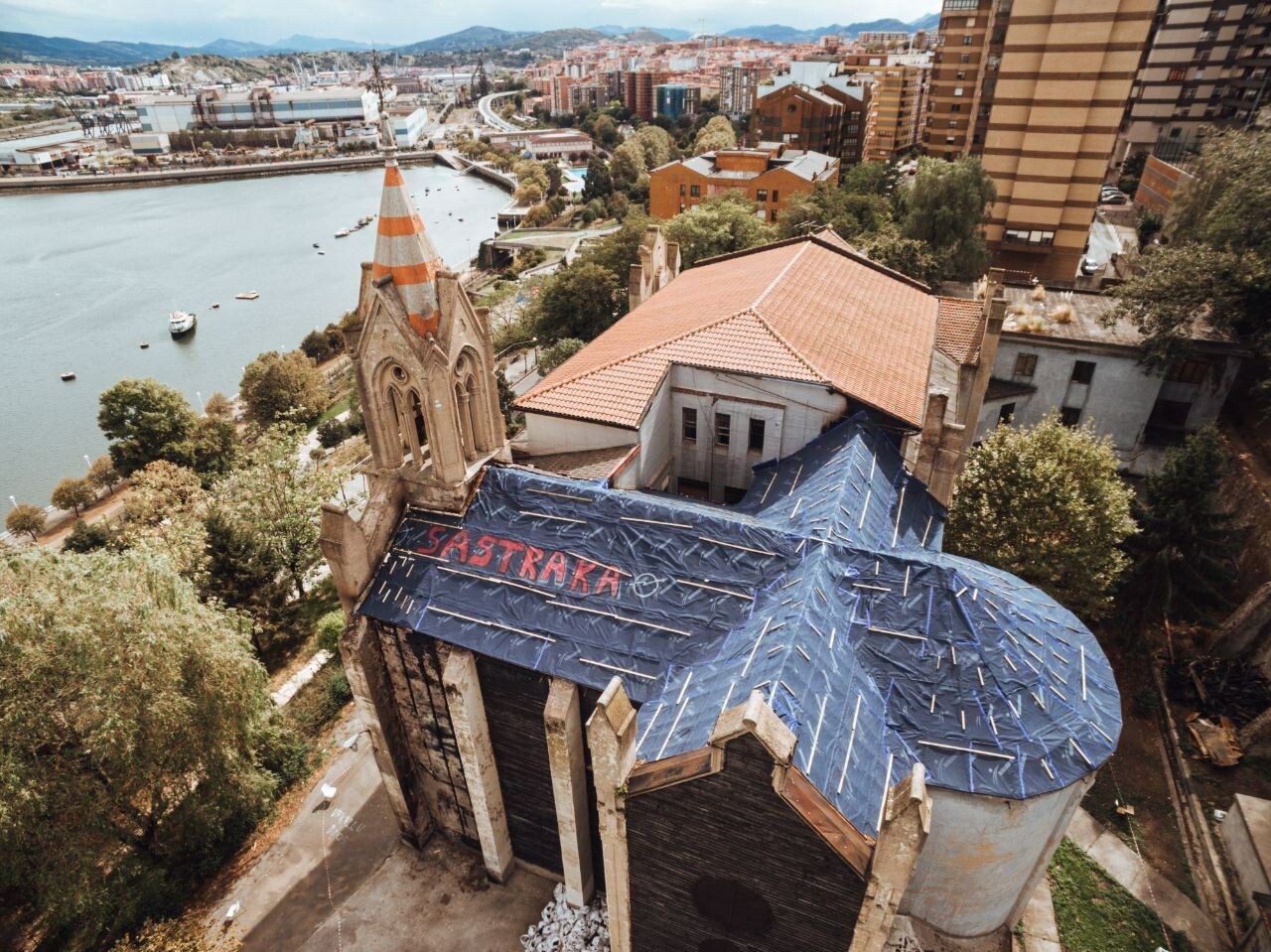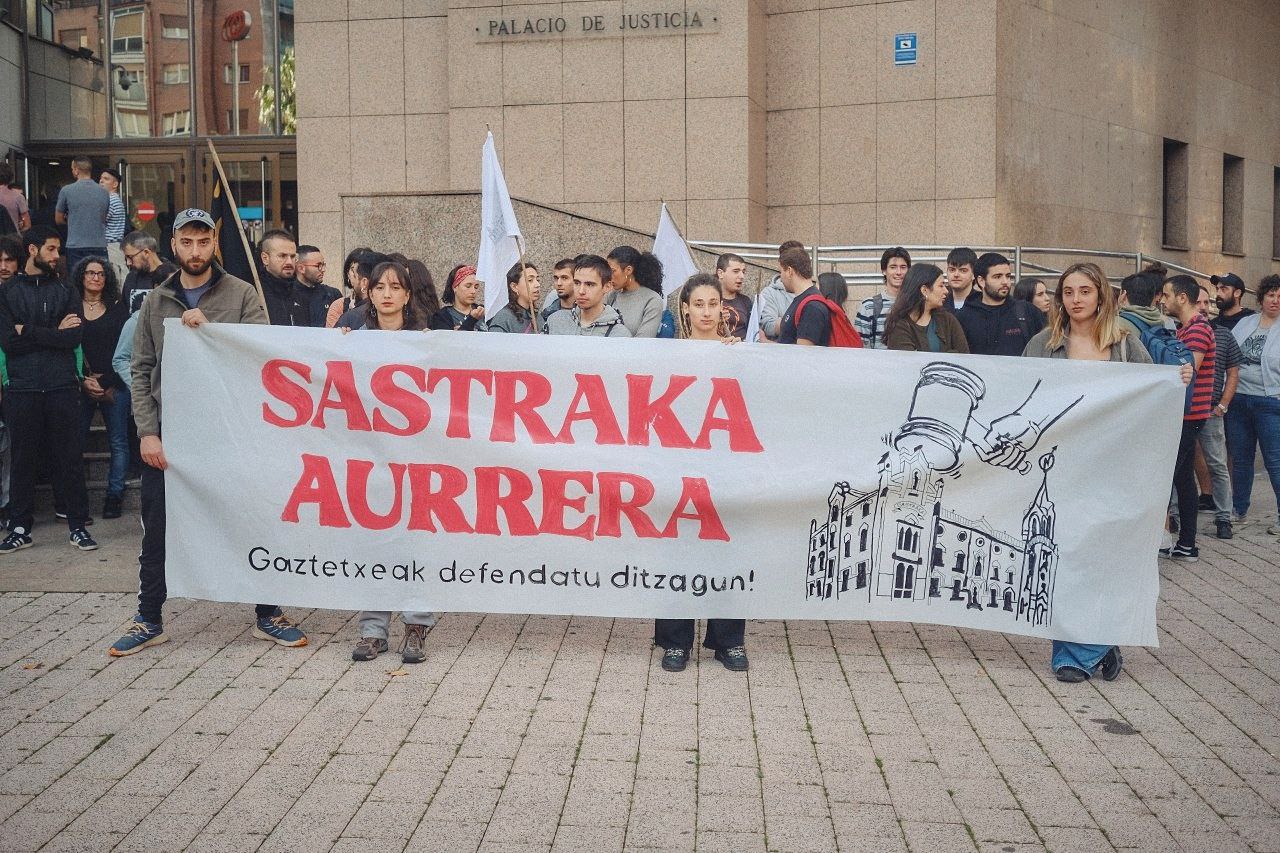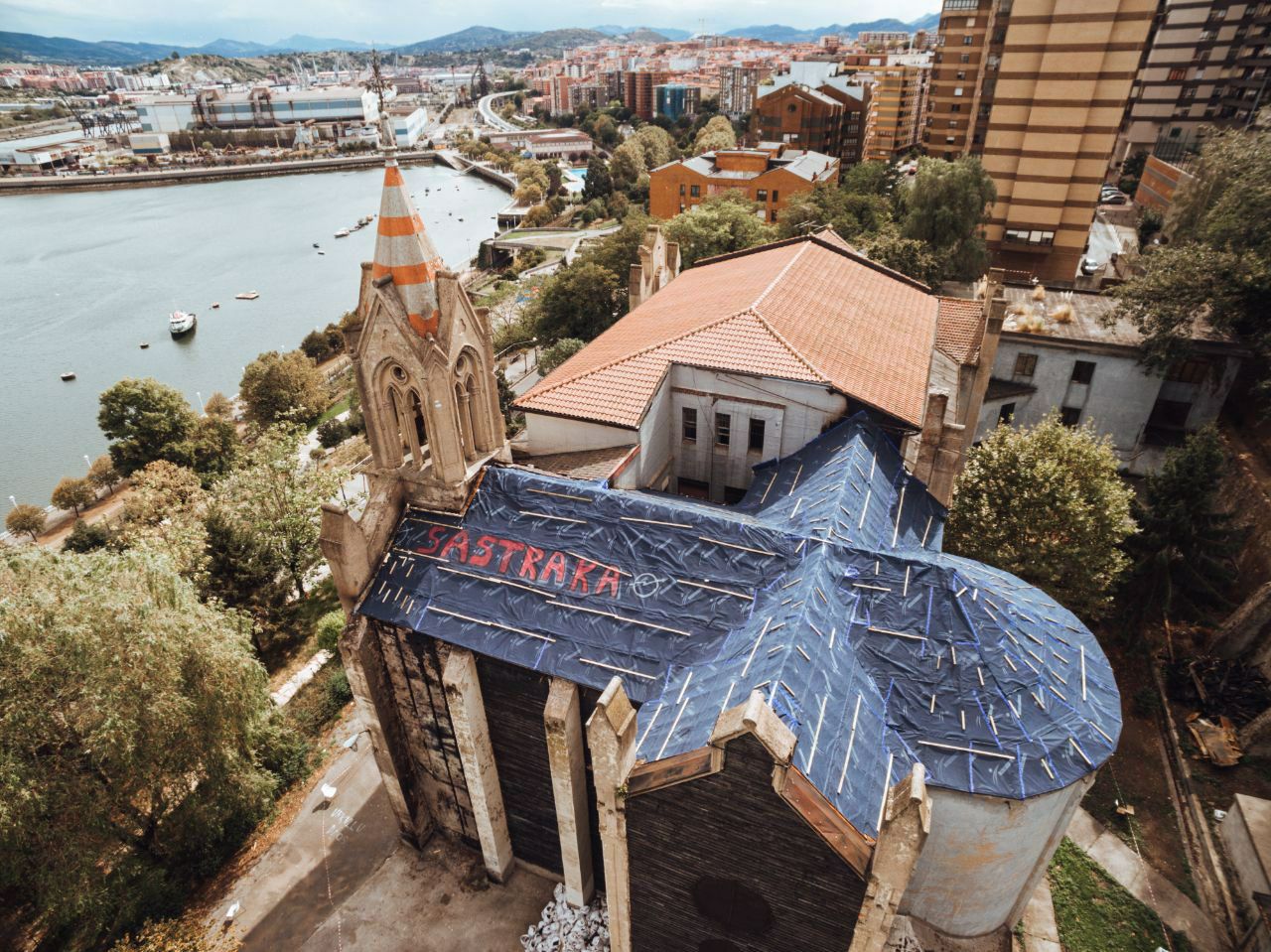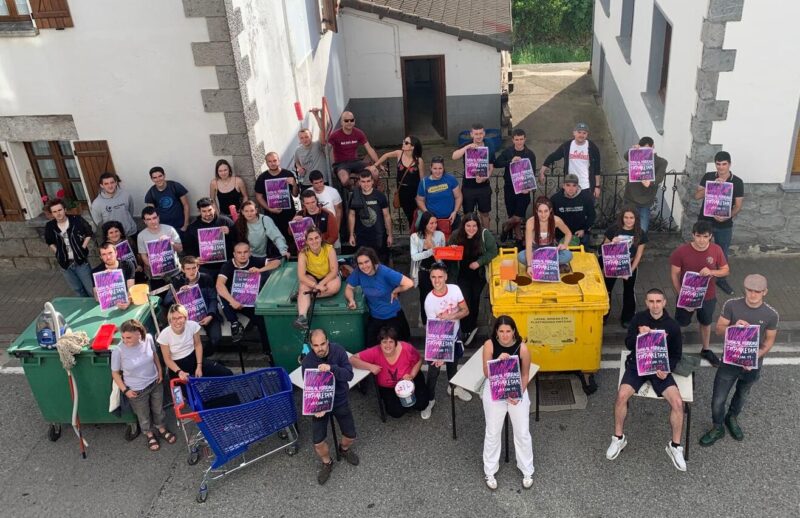Recognition and memory, also from fiction
- The Oñati Antixena Gaztetxe Center has reached ten years in 2022 and on the occasion of its anniversary, members of the assembly have made a non-profit audiovisual. The idea they had to document the past has finally been projected as fiction. And fiction, without going too far, could be a reality. The City Hall will expropriate gaztetxe in the imaginary village of Oñati, where concepts such as memory, organization and the struggle of the past will be very present.

It is the year 2032, summer time, and under the doors have received a letter the four young people who have gathered together between four stone walls or heat escapes. The message of the letter states that within two weeks the City of Oñati, responsible for the building and signatory of the letter, must leave the old School of Hospitality of Oñati and the subsequent Casa Antixena Gaztetxea, so that current users can use it as a cultural space. The municipal government thinks that from Oña there is a lack of a modern building to enrich the cultural offer, and that it is time to open a safe and plural space to the people, as if Antixena did not fulfill that function. Nothing of all kinds serves the powerful, and the authorities will certainly use avant-garde terms and alternative buildings as arguments for building a cultural meeting point. Certain groups will always be in the eyes of some, as in Oñati, even in the Basque Country and around the world.
But we're just talking about an imaginary case. The members of Antixena Gaztetxe have made a fictional film on the occasion of the 10th anniversary of the gaztetxe, when Ixili wants us, under the title Mari. To materialize the idea that emerged from the weekly assembly, Anjel Lera, Mikel Garai, Xanti Ugarte and Jone Markuleta, citant with ARGIA (1999, Oñati), have been a group engine. It is characterized by being fictitious, since there are not few audiovisual works that have been made around cheese shops and popular movements, but all those that have become known in general have the objective of documenting the action. “And we were also walking down that road: that blessed day, the one we decided not to make fiction or documentary,” says Markuleta with a smile. We stayed with Markuleta in the local schools to introduce the film and exercise to bring the gaztetxe project closer to the teenagers. Antixena at Gaztetxe, where not.
.jpg)
They persuaded him to do fiction. -Yes. The problem is that we looked at the previous castles and movements and what did we have to do, interview
a member of each gaztetxe? The Antixena has turned 10 years old and the rest of it, even occupations of one day or another. We found it difficult to measure the space allocated to each. What would we confess to four or five people? So we decided to make fiction. But without completely losing the character of the documentary, it is not able to grow. A friend told us, “You are going to eat lentils with macaroni.” Because in one scene, when I concerted my father, we had a very long paragraph to account for the occupations of the past. But that, very long. Lentils with macaroni.
Fiction can open the doors to break more and more roads, an aspect that has been important in this wager. They have shown that the threat of expropriation can also be addressed from fiction, even if it is an almost permanent reality in many neighborhoods and towns. In any case, acting in a more stable or unstable way is, above all, the objective of every gaztetxe and collective that with the film they want to accomplish in Oñati: to open a space to the people like the gaztetxe and to deconstruct various perceptions; “to deal with indifferences”, as Markuleta points out. “People will continue to feel outside the gaztetxe and people will always have the perception that it is a place that is not theirs and will never be,” he believes, but without going too far into those cracks that cannot be cured, moving us to what we have, he says yes with a small smile: people have felt identified with the film.
It indicates that a new form of militancy has been created because a group of people who have been on the production team has not often approached gaztetxe and is cause for satisfaction. Gaining legitimacy in the people is usually key in the occupied and self-managed space, but it also requires a job to take the step and ensure continuity and fluidity; then, as a challenge and as will be seen in the film, to see if in the face of an expropriation it is able to bring people together and stay the ghost, at least to protest. “If so, there [Antixena] I would like the stairs below to be full, so I imagine in the face of an expropriation; and in the film not so many people moved, but it was a lot, and we got together a lot of people who are not members of the assembly.”
Quiet and stable Ten years after the occupation of the old hospitality school and the implementation of the Gaztetxe
Antixena, the space has gained the legitimacy of acting in a stable way. At the moment, the spectre of expropriation can only appear in an imaginary situation. Or in a fictional movie, at the initiative of an assembly that imagines itself expropriated. Markuleta says the activity is constant today and believes the environment is quiet. Maybe too stable.
- Why do you say that? “I can’t speak in a generality, but the feeling that many of us share is that we’ve gotten into comfort, winning well for many years. And I don't mean we don't do anything, Antixena is a referent
cultural agent, here every weekend there's a lot of stuff and there's a lot of people going around, and now a movie has been made. It's a lot. But that's what I say, we don't have the insecurity that they had before. I have been here for a few years and we have always been very calm in the future, there has never been an extraordinary concern. And of course, better.
"The feeling is that we live in comfort; we have little insecurity"
This kind of calm situation has never experienced the Oñati youth movement. This is what Markuleta has taken for granted, but the past does not have much detail for the current members of the gaztetxe. For the film, out of necessity and desire, many interviews have been held to get to know the events of the past firsthand, and they have come from there and from here they supposedly came. And the way to tell that origin seems like a movie. Because, apparently, the idea of a possible self-management project came from an oñatian ride to Berlin in 1982. Supposedly, free radios and fanzines belonging to the Alto Deba valley came from hand. In short, and with the same point of pride shown in the film, the first gaztetxe of Euskal Herria opened in Oñati (according to the oral officiality, they were the first to use the term gaztetxe). Olaitturri's cheese mill was expropriated in 1986.
There have subsequently been nine other different occupations and many conflicts have arisen with building owners and institutions, according to Markuleta. There was also a hunger strike and numerous camped at the city hall doors. The interviewee recalls the case of an occupied place, owned by the municipalities that was believed not to be demolished, which was still a teenager, was unexpectedly expropriated in the middle of the morning by the City Council and a large number of young people who moved and lived there fleeing from school. One of the first shots was being a spectator of expropriation.
-There arose the need to have a gaztetxe in the town, and the City Hall was very supportive saying there was a gazteleku. But that wasn't good, and it's not good, because we're not there. You are, and that is not the gaztetxe. We will always depend on you, and you want it. At this point of debate they entered San Martin and had already been on the street.
Presence, struggle and street organization, is what Mari drives and highlights throughout the film. Organize, join forces, ensure street presence and combat expropriation. But Mari will not start from scratch, but will look again at those who know him.
The retrospective window We have already mentioned that knowing how to give continuity, fluidity and generation changes can be fundamental for the survival of a collective, and in this sense they have made self-criticism in Oñati. And that is that, from his ignorance, Markuleta
has recognized that he had a point of fear, how the members of the cheesemakers of the past could take the content of the film, whether or not the story has been done right. They were concerned to recognize it and to make mistakes in its content. But it doesn't look like that, he says delighted. The answer is very good in the village.
"Gives impetus to know what was done before; strengthens the current project"
But we can also look the other way around that head breaker, studying what's in the spinal cord and giving way to criticism.
-We also wanted to make
a criticism by saying in some way that Mari knows nothing of the struggles of the past, and in general of the past of the Gaztetxe and Gaztetxe movements. Who walked and where, for example, little. There is a great lack of knowledge, as if everything was very closed. And now, asking myself this way, on the one hand I'm going to say yes, that Antixena always has the doors open, but on the other hand I would say no, I think. -Even if we open doors, we must be able to exchange information. "I also knew there were
more cheesemakers in Oñati, but I didn't know there was so much movement, much less, and Mari won't know if he's going to be in ten years' time. And that's where the movie also starts. That memory exercise has not been done and I do not know why. We, in making the film, have had to look back and it has been very helpful to us to collect that knowledge. And somehow, it has served us to believe and give strength to the young man of today. I don't know, it gives you momentum to know what things were done in favor of getting a stable place to do the first activity. Now we have that place, but what's said, we don't know much about the past. And in the end, you go into a house that you know little about the past of that place.
.jpg)
The comrades have come together to find out, because in their day the parents of a member of the assembly participated, and they have come to the conclusion that in all the bars you can find one that knows a lot. The film also makes reference: “We are commenting on all the projections we are making, because we have not been so aware that in your town you also have a person like ‘Txator’, perhaps not so, but they certainly know a lot of stories.”
Surely, therefore, in Elorrio, Burlada, Altsasu / Alsasua, Olazti / Olazagutia, Donostia / San Sebastian and Bilbao you will find something similar to the Txator of Oñati, as there will be many options to watch the film and talk about content. They know that if they had made the documentary they would have the most limited doors, and that they will therefore be lucky enough to be able to leave the Alto Deba and maybe go to Madrid and Barcelona, because thanks to a friend translator they want to return to Catalan and Galician. In the villages that they present, they expect the effort to reflect to
be seen, because, even if it is installed in Oñati, the topics that are discussed can be given in all the queserías, because in the end concepts that are not extinguished are introduced: the organization and the struggle, and the memory of the past activity, for later recognition.
Larrabetzuko Hori Bai Gaztetxeak 60 urte bete ditu. Euskal Herriko Gaztetxe zaharrena da Larrabetzukoa.
Pasa den urriaren 30ean, Portugaleteko Sastraka Gaztetxeko bederatzi lagun auzipetu zituzten. Handik egun batzuetara Portugaleteko kaleak hartu zituzten hainbat lagunek gaztetxearen defentsan. Bi egun geroago, fiskalak karguak kendu zituen.
Isabelle Pargade Hazparneko auzapezak ofizialki eman dizkio Ttattola gaztetxeari lokal berriaren gakoak. Bien arteko negoziaketa luze batzuen ondorio da.












